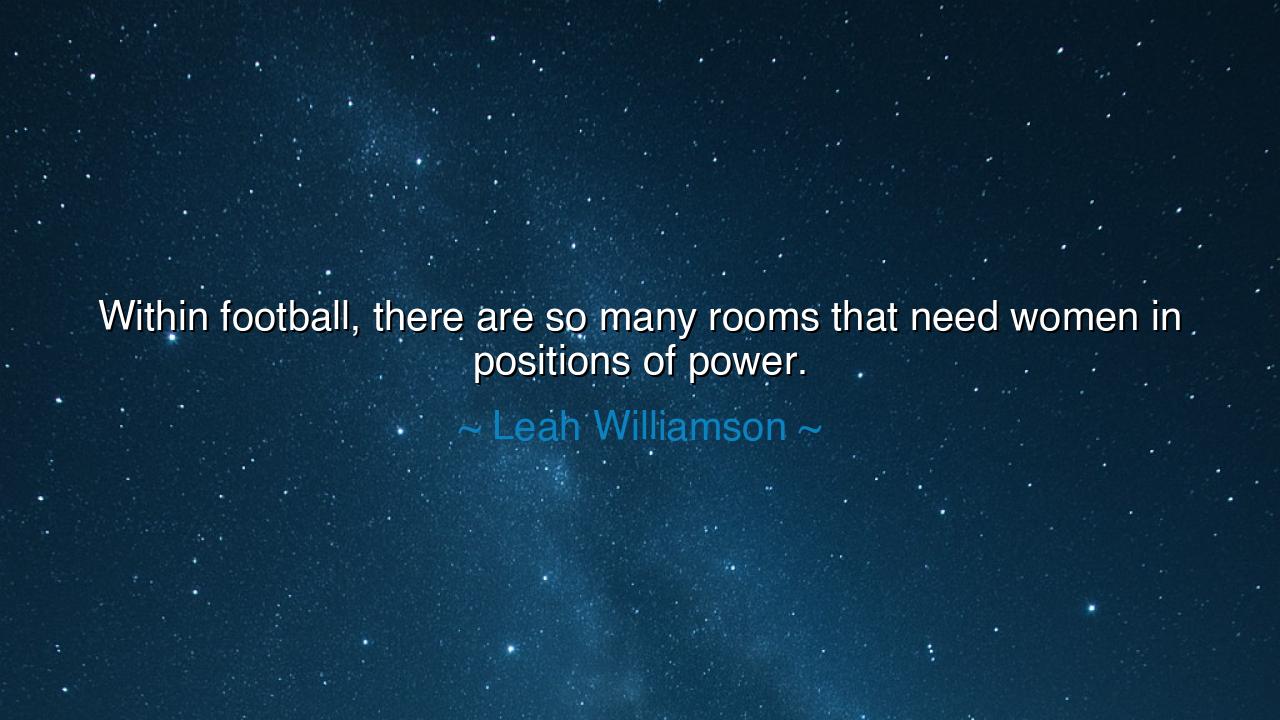
Within football, there are so many rooms that need women in






In this bold declaration, Leah Williamson speaks of the urgent need for women in positions of power within the world of football. She reminds us that the game is not only played on the pitch but shaped in countless hidden spaces — boardrooms, strategy meetings, and decision-making halls. These are the rooms where policies are crafted, opportunities are given or withheld, and the future of the sport is decided. By calling for women to hold power in these places, Leah shines a light on the imbalance that has long existed and the change required to bring true equality to the game.
Her words reflect a deep understanding of history. For centuries, football — like many institutions — has been dominated by men, both on and off the field. Even as women fought for the right to play, they were often excluded from the conversations that governed the sport’s growth. This exclusion created a cycle where female voices were silenced, and decisions were made without considering their perspectives. Leah’s call is not merely about representation; it is about justice and ensuring that football reflects the diversity and passion of all who love it.
A powerful historical parallel can be found in the rise of Billie Jean King, who transformed the world of tennis through her fight for gender equality. When she demanded equal prize money for women, she was not simply fighting for herself but for every female athlete denied recognition. Her leadership outside the court reshaped the sport forever. Leah’s words carry the same spirit: that women must not only play the game but help govern it, bringing balance to a system that has too often been built by and for men alone.
The metaphor of “rooms” also speaks to the hidden nature of power. Matches are seen by millions, but the decisions that make those matches possible are made behind closed doors. If women are absent from those rooms, their needs, ideas, and visions remain unheard. This creates a sport that grows in strength physically but remains weak morally. By placing women in these spaces, football can become not only more inclusive but also wiser, as diversity of thought leads to innovation and fairness.
Thus, Leah’s reflection is both a challenge and a prophecy. If football truly wishes to embody the values of teamwork, unity, and perseverance, it must open its doors to women at every level of leadership. For when women rise to positions of power, they do not only uplift themselves — they create pathways for generations to come. In this way, the beautiful game can become more than a sport: it can be a beacon of equality, showing the world what is possible when every voice is heard and every player, on or off the pitch, is valued.






PCNguyen Phuong Chi
Leah Williamson’s insight about the need for women in football leadership roles is eye-opening. In many industries, including sports, the lack of women in power positions leads to missed opportunities for change. What do you think are the first steps towards breaking down the barriers for women in football’s upper echelons? Could it be about creating mentorship, improving representation, or perhaps dismantling deeply entrenched gender biases in the sport?
UBUyen Bao
Leah Williamson’s statement makes me think about the power imbalance in football. Why do sports like football, which have a massive global following, still struggle with gender equality in leadership? If more women were in decision-making positions, could we see a shift in how the sport develops, especially in terms of inclusivity and representation of underrepresented groups? It feels like football could evolve significantly with more female leadership.
BAng bi an
I agree with Leah Williamson’s call for more women in positions of power in football. It's surprising that despite the success of women’s football and the growing involvement of women in the sport, there is still such a disparity in leadership. What are the key factors preventing women from entering these positions? Is it a cultural issue or more about a lack of opportunity and support for women?
GHTruong Gia Huy
Leah Williamson brings up a valid concern about women needing more representation in football's leadership. It makes me wonder—what impact would women in power roles have on the sport? Would their perspectives change the way football organizations operate? It seems like having more diversity in decision-making positions could bring about more inclusive and innovative changes in the sport, don’t you think?
QMNguyen Quan Minh
Leah Williamson’s statement highlights an important point about the lack of female representation in leadership roles within football. What is it about the structure of football that keeps women out of positions of power? Are there specific barriers that need to be addressed for gender equality in sports? How can the industry better support and promote women to fill these crucial roles and shift the power dynamics?